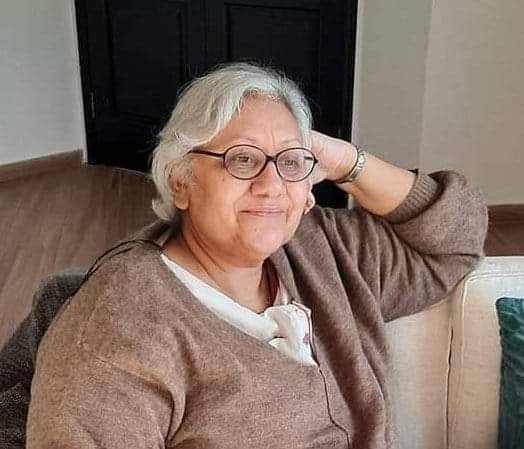
Last year on August 27th 2021 we lost Dr. Rubina Saigol. Known as a scholar and a member of Women’s Action Forum, she was my maternal aunt, my Ruby Khala.
Dr. Rubina was diagnosed with covid on August 3rd and by August 14th she was hospitalised. Yet, she was adamant to attend the webinar she had helped organise for WAF. Many of her colleagues and friends till then did not know her plight at that time. At the same time, the Taliban were re-emerging in Afghanistan after the Americans had left. From her hospital room she would whatsapp us with extreme concern for Afghan girls and women and their future in light of the developing political situation there.
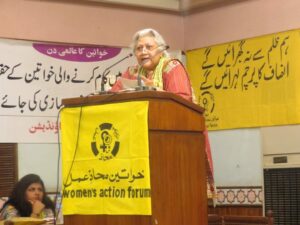 One day, we received a frantic message from her saying that her phone’s charger had broken down and that she couldn’t afford that because her phone was her only contact with the outside world that kept her going during this time of isolation and misery. I had to immediately make arrangements to ensure this was sorted as soon as possible so that she would be comfortable knowing that she will not lose contact with her connections, her near and dear and loved ones.
One day, we received a frantic message from her saying that her phone’s charger had broken down and that she couldn’t afford that because her phone was her only contact with the outside world that kept her going during this time of isolation and misery. I had to immediately make arrangements to ensure this was sorted as soon as possible so that she would be comfortable knowing that she will not lose contact with her connections, her near and dear and loved ones.
On several occasions her state of mind and her ordeal due to covid especially the isolation, took me back to the time when she was diagnosed with cancer in 2016. Back then despite being ill, she became more jovial and positive in her attitude and mind frame with every chemo session she had knowing fully well that all her loved ones, her friends were by her side supporting her. We saw the same spirit when she had dengue before that. However, with covid it was different due to isolation. It was enough to break any person to a point where they lose the strength to fight. In an already vulnerable state, knowing that you have no one of your own near you in the flesh is extremely traumatic.
To add to the trauma however, the protocols of the hospitals which includes the payment of dues before an injection is administered or any test is conducted, was harrowing and an aspect which is not spoken about enough. Just imagine, a person who is all alone, in isolation, in a covid ward where access is limited and attendants from patient’s families cannot stay, gasping for breath and unable to leave the hospital being pestered for clearing dues on a daily basis for the treatment to proceed. And for families such as ours where we had multiple members fall prey to covid when my paternal aunt, my phuppi, who also expired due to covid prior to Dr. Rubina, we knew what to expect financially and were more than willing to pay.
Medical treatment for covid is by no means economic. The whole treatment consisting of medicines and hospital machinery goes into hundreds of thousands of rupees. We stepped in and expressly told the hospital to not bother her with financial matters and to direct those bills to us but by then they had already stressed Dr. Rubina out so much that she felt defeated. And although she was a very upright and self-respecting person and all her life had saved for times like these, to still be dependent on others for taking care of payments must have been an extremely difficult and emotionally draining proposition for her. As family, we kept telling her not to worry about it, but the person that she was, it must have been internally bogging her down immensely.
In the face of most challenging times in her life I had seen her smile, dance, sing and sail through but for the first time during covid and its isolation she texted saying, ‘I ain’t coming outta this alive’. Rubbishing her thoughts, I spoke to her about keeping her spirits high. I told her not to worry, that she will get through, that she is a fighter. But somehow she knew her time was near.
Even when the doctors told us that she may have just forty-eight more hours remaining, we had the hope for a miracle alive in us. Every movement of her limbs, every intake of food, every bodily movement gave us hope. We were so desperate for her to recover that we went into denial. Her reports were deteriorating by hours. The clotting in her blood (D-Dimer) was multiplying leading to insufficient flow of oxygen to her vital organs. She had to be put onto the ventilator.
My mother insisted and didn’t care that it was the middle of the night, she wanted to go inside the ward and see her sister. Securing permission from the doctor to see her, we wore our protective suits and shields and took my mother to see her sister for the last time before Dr. Rubina was put on the ventilator.
Ruby Khala woke up from her slumber as soon as she heard us in the ward and started waving at us with a child-like enthusiasm of a wish coming true but also like a farewell before a journey from which there was no return. It was a bitter-sweet moment and I am glad my mother and her sister got that moment. Sometimes, that is all one needs before it’s all gone.
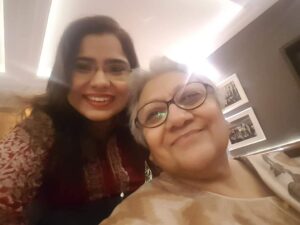
The news of her passing travelled around the world and people from remote corners called and expressed their grief and sorrow. She was a venerated scholar and prominent figure of the women’s movement in Pakistan and South Asia but what one never realised was the sheer number of lives she had touched and how much of an iconic and larger than life persona she had.
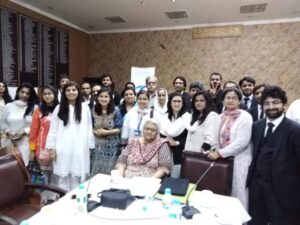
People recalled the many times she had helped them with their research and work and was a mentor to many. People also remembered how she lit up every gathering and was the centre of all jokes, laughter, ‘tappay’ and all things jovial. Humour, songs and dance were part of her resistance and her legacy as much her serious and more formal writings. So complete she was in her resistance and in her expression that her loss was felt like a dent to the women’s movement itself. Some shoes can never be filled. Hers are such, but she has left footprints for us to follow and we shall carry on the struggle as she had hoped, one day, we would.
Dr. Rubina was diagnosed with covid on August 3rd and by August 14th she was hospitalised. Yet, she was adamant to attend the webinar she had helped organise for WAF. Many of her colleagues and friends till then did not know her plight at that time. At the same time, the Taliban were re-emerging in Afghanistan after the Americans had left. From her hospital room she would whatsapp us with extreme concern for Afghan girls and women and their future in light of the developing political situation there.
 One day, we received a frantic message from her saying that her phone’s charger had broken down and that she couldn’t afford that because her phone was her only contact with the outside world that kept her going during this time of isolation and misery. I had to immediately make arrangements to ensure this was sorted as soon as possible so that she would be comfortable knowing that she will not lose contact with her connections, her near and dear and loved ones.
One day, we received a frantic message from her saying that her phone’s charger had broken down and that she couldn’t afford that because her phone was her only contact with the outside world that kept her going during this time of isolation and misery. I had to immediately make arrangements to ensure this was sorted as soon as possible so that she would be comfortable knowing that she will not lose contact with her connections, her near and dear and loved ones.On several occasions her state of mind and her ordeal due to covid especially the isolation, took me back to the time when she was diagnosed with cancer in 2016. Back then despite being ill, she became more jovial and positive in her attitude and mind frame with every chemo session she had knowing fully well that all her loved ones, her friends were by her side supporting her. We saw the same spirit when she had dengue before that. However, with covid it was different due to isolation. It was enough to break any person to a point where they lose the strength to fight. In an already vulnerable state, knowing that you have no one of your own near you in the flesh is extremely traumatic.
To add to the trauma however, the protocols of the hospitals which includes the payment of dues before an injection is administered or any test is conducted, was harrowing and an aspect which is not spoken about enough. Just imagine, a person who is all alone, in isolation, in a covid ward where access is limited and attendants from patient’s families cannot stay, gasping for breath and unable to leave the hospital being pestered for clearing dues on a daily basis for the treatment to proceed. And for families such as ours where we had multiple members fall prey to covid when my paternal aunt, my phuppi, who also expired due to covid prior to Dr. Rubina, we knew what to expect financially and were more than willing to pay.
Medical treatment for covid is by no means economic. The whole treatment consisting of medicines and hospital machinery goes into hundreds of thousands of rupees. We stepped in and expressly told the hospital to not bother her with financial matters and to direct those bills to us but by then they had already stressed Dr. Rubina out so much that she felt defeated. And although she was a very upright and self-respecting person and all her life had saved for times like these, to still be dependent on others for taking care of payments must have been an extremely difficult and emotionally draining proposition for her. As family, we kept telling her not to worry about it, but the person that she was, it must have been internally bogging her down immensely.
In the face of most challenging times in her life I had seen her smile, dance, sing and sail through but for the first time during covid and its isolation she texted saying, ‘I ain’t coming outta this alive’. Rubbishing her thoughts, I spoke to her about keeping her spirits high. I told her not to worry, that she will get through, that she is a fighter. But somehow she knew her time was near.
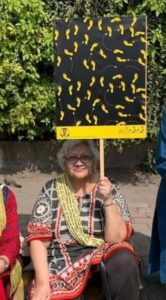
Even when the doctors told us that she may have just forty-eight more hours remaining, we had the hope for a miracle alive in us. Every movement of her limbs, every intake of food, every bodily movement gave us hope. We were so desperate for her to recover that we went into denial. Her reports were deteriorating by hours. The clotting in her blood (D-Dimer) was multiplying leading to insufficient flow of oxygen to her vital organs. She had to be put onto the ventilator.
My mother insisted and didn’t care that it was the middle of the night, she wanted to go inside the ward and see her sister. Securing permission from the doctor to see her, we wore our protective suits and shields and took my mother to see her sister for the last time before Dr. Rubina was put on the ventilator.
Ruby Khala woke up from her slumber as soon as she heard us in the ward and started waving at us with a child-like enthusiasm of a wish coming true but also like a farewell before a journey from which there was no return. It was a bitter-sweet moment and I am glad my mother and her sister got that moment. Sometimes, that is all one needs before it’s all gone.

The news of her passing travelled around the world and people from remote corners called and expressed their grief and sorrow. She was a venerated scholar and prominent figure of the women’s movement in Pakistan and South Asia but what one never realised was the sheer number of lives she had touched and how much of an iconic and larger than life persona she had.

People recalled the many times she had helped them with their research and work and was a mentor to many. People also remembered how she lit up every gathering and was the centre of all jokes, laughter, ‘tappay’ and all things jovial. Humour, songs and dance were part of her resistance and her legacy as much her serious and more formal writings. So complete she was in her resistance and in her expression that her loss was felt like a dent to the women’s movement itself. Some shoes can never be filled. Hers are such, but she has left footprints for us to follow and we shall carry on the struggle as she had hoped, one day, we would.

